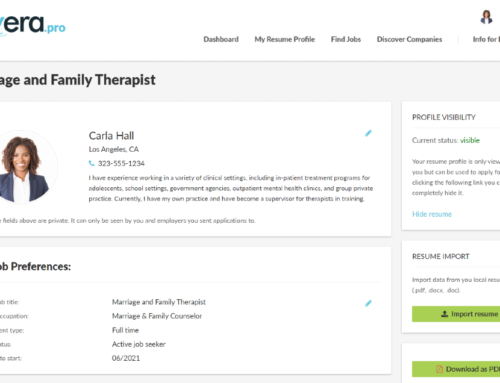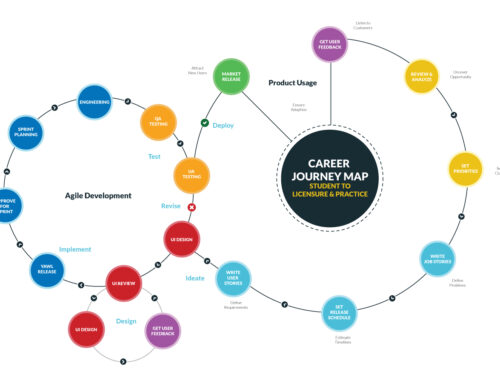OVERVIEW
Dr. Carrie Singer, licensed clinical psychologist, founder, and CEO of Quince Orchard Psychotherapy, a group mental health practice employing over 30 therapists in the DC and 2018, 2019, and 2020 Inc 5000 list award recipient for fastest-growing businesses in the U.S., discusses the challenges of finding qualified candidates.

Dr. Carrie Singer
Q: Thank you for talking with us today! Please introduce yourself.
A: Hi, I’m Dr. Carrie Singer, a licensed clinical psychologist, founder, and CEO of a group practice in the DC suburbs called Quince Orchard Psychotherapy.
Q: What made you interested in becoming a psychologist and starting a private practice?
A: Like most people who enter the field, it’s a combination of personal and professional interests. There are so many people suffering from mental health afflictions and not getting the help that they need. I was always curious about the human brain and how it works, especially abnormal psychology. It’s a fascinating line of work that provides the chance to make a difference, most people can’t say that about their job.
Once I got my degree, I worked in a variety of school and hospital settings, but the hours were long and the patients fairly complex. It was then I knew I wanted to do private practice to have the freedom and flexibility to practice the way I wanted to.
Q: How did you know it was time to expand your private practice? How did you go about that expansion?
A: My private practice took off quickly because I took health insurance and not many people in our area did. People were calling every day to get on the waitlist and I was spending two hours returning phone calls to people who couldn’t find therapists that took their insurance. After a year of that, I thought, “Maybe I should just try to hire someone,” and I did. Then, they got full, the next person got full, and we had to get a bigger office. Within two years, I had 30 therapists working with me and we still had over 300 patients on a waitlist. It kind of happened organically, but did require a lot of effort and strategizing.
A year and a half ago, we joined an accountable care organization in our area that has 2,500 physicians in seven different states. It allows doctors to join forces with other doctors to outsource billing, electronic health record costs, insurance credentialing, credit card processing, and the like. This has provided an abundant referral stream and the chance to learn more about the importance of behavioral health integration in primary care.
Q: Are you still practicing and seeing clients?
A: I’ve scaled back a lot because it’s hard to wear all of the hats. I feel good helping clients with their individual problems, but know as a business owner, growing our team of therapists will serve the community in a more comprehensive way.
Q: How have you scaled the admin side of your business?
A: It was difficult to figure out at first, but we paced the hiring of front desk, billers, bookkeepers, and office managers based on the number of patients we were treating. We have about 10 admin staff supporting 30 therapists, which feels like a good ratio where everyone has the support they need. I’ve taken notes from business coaches, business mastermind groups, and lots of books, blogposts, and listservs to glean best practices in human resources, customer service, accounts receivable management, etc.
We have tried to stand out by making our workplace a “turnkey” experience for therapists. I don’t want them to have to do their own billing, scheduling, and marketing, because that’s why they want to join a group. We offer a full benefit package they would not be able to have if they were to practice solo.
Q: Can you explain why treating your therapist employees as customers in a way and designing for their experience is so important to you?
A: Being someone who doesn’t really like rules, bosses, or authority, I reflected on who would be the type of person that I would want to work for. I would like someone who had been in my shoes, who could identify with some of my pain points, and someone who would always strive to be empathetic, organized, and fair. Patient referrals are unfortunately pretty easy to come by. Finding talented therapists who are a great fit for the team is harder to do, we want to focus on appreciating and retaining them.
Q: What are the benefits and drawbacks of working at a group private practice?
A: In general, private practice allows for more flexibility and variety than agency-based roles. Nationwide, most group practices operate on a 60/40 split with 60% going to the therapist. Most practices hire their therapists as independent contractors with no tax contributions, benefits, or real job security. We think that model is unfair and have developed a career model that parallels agency benefits, but with higher pay and more autonomy. The clients tend to be fairly high-functioning and are coming because they want to get better. The work is rewarding. The only drawbacks I can think of are potentially isolation and burnout, but that’s pretty much normal life during the pandemic. We pay all of our therapists to attend individual and peer supervision to avoid these.
Q: What are some of the barriers you’ve found hiring the right people?
A: The number one barrier is the supply and demand issue. We’ve tapped out the local talent pool after our nearest training university shut down last year. There are so many patients and not enough people to treat them, especially those who specialize in work with trauma, eating disorders, children, CBT, and DBT. With the new national telehealth licensure compact, we are beginning to court therapists from different states and be more open to those who want to work very part-time from home.
Sometimes new grads expect to work four days per week and make six figures. We pay well, but our reimbursements are tied to the number of clients treated. Sometimes this also becomes a barrier to hiring: unrealistic market expectations. We know student loans often drive this need and are looking into qualifying as a loan forgiveness site.
Q: How do you deal with different state regulations and licensure?
A: For disciplines like counseling and social work, they don’t have the national licensure compact yet. During the pandemic a lot of states have given temporary permissions and relaxed the regulations, so we’ve been able to treat some people out of state. For example, if you have a patient and they need to relocate for a month because their house burned down it’s tough to say, “I’m sorry, I can’t treat you. Please go find somebody in that very temporary jurisdiction,” this doesn’t make sense for continuity of care. It’s an evolving landscape. Hopefully the pandemic will spawn lasting regulatory change.
Q: How do you vet a candidate? What are some of the criteria that you look for, both tangible and intangible?
A: In the beginning, we were so eager to grow and meet the patient need that we kind of just hired almost anyone with a license. While they were good clinicians, those who have prematurely exited our team were those who struggled with writing their notes on time, those with a lot of client turnover who weren’t receptive to supervision, and those who evoked too much coworker drama. It’s hard to screen for those in an initial meeting, but we do panel interviews now with our Clinical Directors and have learned to hire slow, fire fast. The easiest clinicians to employ are flexible in terms of hours, age range, and diagnostic presentations they are willing to work with. Patients under the age of ten, those who can only come to sessions on evenings or weekends, and patients with more severe pathology are the hardest to place.
Q: Where have you gone to look for these qualified candidates before?
A: We’ve used APA PsycCareers, but it’s expensive and it’s usually people who are looking for more academic kinds of positions, not so much like clinical, applied counseling, or psychologist positions. We’ve tried posting on our state association boards too but it’s really hard to stand out. We haven’t found a lot of great consistent channels, which is why now we’re using a recruiting firm and we’re trying to go the route of identifying who the licensed clinicians are in our state and trying to engage them directly to maybe even convert people who aren’t necessarily looking for jobs.
Q: How much time and money do you think it costs on average to hire a new clinician?
A: Advertising costs can be high. We pay Indeed $1200 a month to be featured on the first page of search results and often still get no hits. Between what we pay our Recruiter, HR Director, and Clinical Directors to scout, vet, credential, and onboard new hires, the process could easily cost $1000 per candidate.
Q: What is the life cycle of a job opening from start to hire?
A: We’re always hiring. Say we want to hire a new psychiatric nurse practitioner, we’re going to start looking at least three months in advance. Especially if they’re from out of state, they’re going to have to get their local clinical license and DEA license and do all their insurance credentialing.
Q: What’s the cost of a bad hire?
A: That’s hard to quantify, but I’d say that could potentially be a $300,000 mistake if a therapist leaves on a toxic note and convinces two others to do the same.
Q: Do you need very specialized candidates?
A: Not really, we have a generalist practice. Among the clinicians who comprise our team, there are some who want to work with kids and adolescents, some want to focus on adults, and some specialize in couples. We want them matched with the population they are best-versed with because they’re going to do the best work with them. If they want to have versatility, we give them extra training.
Q: When you’re looking for candidates, are there certain qualifications that help you stand out?
A: Anybody who’s had something that resembles an outpatient experience that’s similar to our workplace is a good thing. It’s nice to see people who could hit the ground running with an understanding of how to do longer-term therapy. That’s not to say we can’t work with people who’ve only, say, worked in hospital settings, but sometimes we’ll get school psychologist candidates who have really never done anything other than testing kids in schools. It would be a hard transition to re-specialize.
Q: Do you like new grads versus more experienced therapists?
Thank you to Dr. Carrie Singer for sharing her private practice lessons with us!

The #1 Career Site for the Helping Professions
SOLUTIONS
RELATED POSTS
PRODUCT OVERVIEW
See how Tevera can elevate your program.
OVERVIEW
Dr. Carrie Singer, licensed clinical psychologist, founder, and CEO of Quince Orchard Psychotherapy, a group mental health practice employing over 30 therapists in the DC and 2018, 2019, and 2020 Inc 5000 list award recipient for fastest-growing businesses in the U.S., discusses the challenges of finding qualified candidates.

Dr. Carrie Singer
Q: Thank you for talking with us today! Please introduce yourself.
A: Hi, I’m Dr. Carrie Singer, a licensed clinical psychologist, founder, and CEO of a group practice in the DC suburbs called Quince Orchard Psychotherapy.
Q: What made you interested in becoming a psychologist and starting a private practice?
A: Like most people who enter the field, it’s a combination of personal and professional interests. There are so many people suffering from mental health afflictions and not getting the help that they need. I was always curious about the human brain and how it works, especially abnormal psychology. It’s a fascinating line of work that provides the chance to make a difference, most people can’t say that about their job.
Once I got my degree, I worked in a variety of school and hospital settings, but the hours were long and the patients fairly complex. It was then I knew I wanted to do private practice to have the freedom and flexibility to practice the way I wanted to.
Q: How did you know it was time to expand your private practice? How did you go about that expansion?
A: My private practice took off quickly because I took health insurance and not many people in our area did. People were calling every day to get on the waitlist and I was spending two hours returning phone calls to people who couldn’t find therapists that took their insurance. After a year of that, I thought, “Maybe I should just try to hire someone,” and I did. Then, they got full, the next person got full, and we had to get a bigger office. Within two years, I had 30 therapists working with me and we still had over 300 patients on a waitlist. It kind of happened organically, but did require a lot of effort and strategizing.
A year and a half ago, we joined an accountable care organization in our area that has 2,500 physicians in seven different states. It allows doctors to join forces with other doctors to outsource billing, electronic health record costs, insurance credentialing, credit card processing, and the like. This has provided an abundant referral stream and the chance to learn more about the importance of behavioral health integration in primary care.
Q: Are you still practicing and seeing clients?
A: I’ve scaled back a lot because it’s hard to wear all of the hats. I feel good helping clients with their individual problems, but know as a business owner, growing our team of therapists will serve the community in a more comprehensive way.
Q: How have you scaled the admin side of your business?
A: It was difficult to figure out at first, but we paced the hiring of front desk, billers, bookkeepers, and office managers based on the number of patients we were treating. We have about 10 admin staff supporting 30 therapists, which feels like a good ratio where everyone has the support they need. I’ve taken notes from business coaches, business mastermind groups, and lots of books, blogposts, and listservs to glean best practices in human resources, customer service, accounts receivable management, etc.
We have tried to stand out by making our workplace a “turnkey” experience for therapists. I don’t want them to have to do their own billing, scheduling, and marketing, because that’s why they want to join a group. We offer a full benefit package they would not be able to have if they were to practice solo.
Q: Can you explain why treating your therapist employees as customers in a way and designing for their experience is so important to you?
A: Being someone who doesn’t really like rules, bosses, or authority, I reflected on who would be the type of person that I would want to work for. I would like someone who had been in my shoes, who could identify with some of my pain points, and someone who would always strive to be empathetic, organized, and fair. Patient referrals are unfortunately pretty easy to come by. Finding talented therapists who are a great fit for the team is harder to do, we want to focus on appreciating and retaining them.
Q: What are the benefits and drawbacks of working at a group private practice?
A: In general, private practice allows for more flexibility and variety than agency-based roles. Nationwide, most group practices operate on a 60/40 split with 60% going to the therapist. Most practices hire their therapists as independent contractors with no tax contributions, benefits, or real job security. We think that model is unfair and have developed a career model that parallels agency benefits, but with higher pay and more autonomy. The clients tend to be fairly high-functioning and are coming because they want to get better. The work is rewarding. The only drawbacks I can think of are potentially isolation and burnout, but that’s pretty much normal life during the pandemic. We pay all of our therapists to attend individual and peer supervision to avoid these.
Q: What are some of the barriers you’ve found hiring the right people?
A: The number one barrier is the supply and demand issue. We’ve tapped out the local talent pool after our nearest training university shut down last year. There are so many patients and not enough people to treat them, especially those who specialize in work with trauma, eating disorders, children, CBT, and DBT. With the new national telehealth licensure compact, we are beginning to court therapists from different states and be more open to those who want to work very part-time from home.
Sometimes new grads expect to work four days per week and make six figures. We pay well, but our reimbursements are tied to the number of clients treated. Sometimes this also becomes a barrier to hiring: unrealistic market expectations. We know student loans often drive this need and are looking into qualifying as a loan forgiveness site.
Q: How do you deal with different state regulations and licensure?
A: For disciplines like counseling and social work, they don’t have the national licensure compact yet. During the pandemic a lot of states have given temporary permissions and relaxed the regulations, so we’ve been able to treat some people out of state. For example, if you have a patient and they need to relocate for a month because their house burned down it’s tough to say, “I’m sorry, I can’t treat you. Please go find somebody in that very temporary jurisdiction,” this doesn’t make sense for continuity of care. It’s an evolving landscape. Hopefully the pandemic will spawn lasting regulatory change.
Q: How do you vet a candidate? What are some of the criteria that you look for, both tangible and intangible?
A: In the beginning, we were so eager to grow and meet the patient need that we kind of just hired almost anyone with a license. While they were good clinicians, those who have prematurely exited our team were those who struggled with writing their notes on time, those with a lot of client turnover who weren’t receptive to supervision, and those who evoked too much coworker drama. It’s hard to screen for those in an initial meeting, but we do panel interviews now with our Clinical Directors and have learned to hire slow, fire fast. The easiest clinicians to employ are flexible in terms of hours, age range, and diagnostic presentations they are willing to work with. Patients under the age of ten, those who can only come to sessions on evenings or weekends, and patients with more severe pathology are the hardest to place.
Q: Where have you gone to look for these qualified candidates before?
A: We’ve used APA PsycCareers, but it’s expensive and it’s usually people who are looking for more academic kinds of positions, not so much like clinical, applied counseling, or psychologist positions. We’ve tried posting on our state association boards too but it’s really hard to stand out. We haven’t found a lot of great consistent channels, which is why now we’re using a recruiting firm and we’re trying to go the route of identifying who the licensed clinicians are in our state and trying to engage them directly to maybe even convert people who aren’t necessarily looking for jobs.
Q: How much time and money do you think it costs on average to hire a new clinician?
A: Advertising costs can be high. We pay Indeed $1200 a month to be featured on the first page of search results and often still get no hits. Between what we pay our Recruiter, HR Director, and Clinical Directors to scout, vet, credential, and onboard new hires, the process could easily cost $1000 per candidate.
Q: What is the life cycle of a job opening from start to hire?
A: We’re always hiring. Say we want to hire a new psychiatric nurse practitioner, we’re going to start looking at least three months in advance. Especially if they’re from out of state, they’re going to have to get their local clinical license and DEA license and do all their insurance credentialing.
Q: What’s the cost of a bad hire?
A: That’s hard to quantify, but I’d say that could potentially be a $300,000 mistake if a therapist leaves on a toxic note and convinces two others to do the same.
Q: Do you need very specialized candidates?
A: Not really, we have a generalist practice. Among the clinicians who comprise our team, there are some who want to work with kids and adolescents, some want to focus on adults, and some specialize in couples. We want them matched with the population they are best-versed with because they’re going to do the best work with them. If they want to have versatility, we give them extra training.
Q: When you’re looking for candidates, are there certain qualifications that help you stand out?
A: Anybody who’s had something that resembles an outpatient experience that’s similar to our workplace is a good thing. It’s nice to see people who could hit the ground running with an understanding of how to do longer-term therapy. That’s not to say we can’t work with people who’ve only, say, worked in hospital settings, but sometimes we’ll get school psychologist candidates who have really never done anything other than testing kids in schools. It would be a hard transition to re-specialize.
Q: Do you like new grads versus more experienced therapists?
Thank you to Dr. Carrie Singer for sharing her private practice lessons with us!

The #1 Career Site for the Helping Professions
OVERVIEW
Dr. Carrie Singer, licensed clinical psychologist, founder, and CEO of Quince Orchard Psychotherapy, a group mental health practice employing over 30 therapists in the DC and 2018, 2019, and 2020 Inc 5000 list award recipient for fastest-growing businesses in the U.S., discusses the challenges of finding qualified candidates.

Dr. Carrie Singer
Q: Thank you for talking with us today! Please introduce yourself.
A: Hi, I’m Dr. Carrie Singer, a licensed clinical psychologist, founder, and CEO of a group practice in the DC suburbs called Quince Orchard Psychotherapy.
Q: What made you interested in becoming a psychologist and starting a private practice?
A: Like most people who enter the field, it’s a combination of personal and professional interests. There are so many people suffering from mental health afflictions and not getting the help that they need. I was always curious about the human brain and how it works, especially abnormal psychology. It’s a fascinating line of work that provides the chance to make a difference, most people can’t say that about their job.
Once I got my degree, I worked in a variety of school and hospital settings, but the hours were long and the patients fairly complex. It was then I knew I wanted to do private practice to have the freedom and flexibility to practice the way I wanted to.
Q: How did you know it was time to expand your private practice? How did you go about that expansion?
A: My private practice took off quickly because I took health insurance and not many people in our area did. People were calling every day to get on the waitlist and I was spending two hours returning phone calls to people who couldn’t find therapists that took their insurance. After a year of that, I thought, “Maybe I should just try to hire someone,” and I did. Then, they got full, the next person got full, and we had to get a bigger office. Within two years, I had 30 therapists working with me and we still had over 300 patients on a waitlist. It kind of happened organically, but did require a lot of effort and strategizing.
A year and a half ago, we joined an accountable care organization in our area that has 2,500 physicians in seven different states. It allows doctors to join forces with other doctors to outsource billing, electronic health record costs, insurance credentialing, credit card processing, and the like. This has provided an abundant referral stream and the chance to learn more about the importance of behavioral health integration in primary care.
Q: Are you still practicing and seeing clients?
A: I’ve scaled back a lot because it’s hard to wear all of the hats. I feel good helping clients with their individual problems, but know as a business owner, growing our team of therapists will serve the community in a more comprehensive way.
Q: How have you scaled the admin side of your business?
A: It was difficult to figure out at first, but we paced the hiring of front desk, billers, bookkeepers, and office managers based on the number of patients we were treating. We have about 10 admin staff supporting 30 therapists, which feels like a good ratio where everyone has the support they need. I’ve taken notes from business coaches, business mastermind groups, and lots of books, blogposts, and listservs to glean best practices in human resources, customer service, accounts receivable management, etc.
We have tried to stand out by making our workplace a “turnkey” experience for therapists. I don’t want them to have to do their own billing, scheduling, and marketing, because that’s why they want to join a group. We offer a full benefit package they would not be able to have if they were to practice solo.
Q: Can you explain why treating your therapist employees as customers in a way and designing for their experience is so important to you?
A: Being someone who doesn’t really like rules, bosses, or authority, I reflected on who would be the type of person that I would want to work for. I would like someone who had been in my shoes, who could identify with some of my pain points, and someone who would always strive to be empathetic, organized, and fair. Patient referrals are unfortunately pretty easy to come by. Finding talented therapists who are a great fit for the team is harder to do, we want to focus on appreciating and retaining them.
Q: What are the benefits and drawbacks of working at a group private practice?
A: In general, private practice allows for more flexibility and variety than agency-based roles. Nationwide, most group practices operate on a 60/40 split with 60% going to the therapist. Most practices hire their therapists as independent contractors with no tax contributions, benefits, or real job security. We think that model is unfair and have developed a career model that parallels agency benefits, but with higher pay and more autonomy. The clients tend to be fairly high-functioning and are coming because they want to get better. The work is rewarding. The only drawbacks I can think of are potentially isolation and burnout, but that’s pretty much normal life during the pandemic. We pay all of our therapists to attend individual and peer supervision to avoid these.
Q: What are some of the barriers you’ve found hiring the right people?
A: The number one barrier is the supply and demand issue. We’ve tapped out the local talent pool after our nearest training university shut down last year. There are so many patients and not enough people to treat them, especially those who specialize in work with trauma, eating disorders, children, CBT, and DBT. With the new national telehealth licensure compact, we are beginning to court therapists from different states and be more open to those who want to work very part-time from home.
Sometimes new grads expect to work four days per week and make six figures. We pay well, but our reimbursements are tied to the number of clients treated. Sometimes this also becomes a barrier to hiring: unrealistic market expectations. We know student loans often drive this need and are looking into qualifying as a loan forgiveness site.
Q: How do you deal with different state regulations and licensure?
A: For disciplines like counseling and social work, they don’t have the national licensure compact yet. During the pandemic a lot of states have given temporary permissions and relaxed the regulations, so we’ve been able to treat some people out of state. For example, if you have a patient and they need to relocate for a month because their house burned down it’s tough to say, “I’m sorry, I can’t treat you. Please go find somebody in that very temporary jurisdiction,” this doesn’t make sense for continuity of care. It’s an evolving landscape. Hopefully the pandemic will spawn lasting regulatory change.
Q: How do you vet a candidate? What are some of the criteria that you look for, both tangible and intangible?
A: In the beginning, we were so eager to grow and meet the patient need that we kind of just hired almost anyone with a license. While they were good clinicians, those who have prematurely exited our team were those who struggled with writing their notes on time, those with a lot of client turnover who weren’t receptive to supervision, and those who evoked too much coworker drama. It’s hard to screen for those in an initial meeting, but we do panel interviews now with our Clinical Directors and have learned to hire slow, fire fast. The easiest clinicians to employ are flexible in terms of hours, age range, and diagnostic presentations they are willing to work with. Patients under the age of ten, those who can only come to sessions on evenings or weekends, and patients with more severe pathology are the hardest to place.
Q: Where have you gone to look for these qualified candidates before?
A: We’ve used APA PsycCareers, but it’s expensive and it’s usually people who are looking for more academic kinds of positions, not so much like clinical, applied counseling, or psychologist positions. We’ve tried posting on our state association boards too but it’s really hard to stand out. We haven’t found a lot of great consistent channels, which is why now we’re using a recruiting firm and we’re trying to go the route of identifying who the licensed clinicians are in our state and trying to engage them directly to maybe even convert people who aren’t necessarily looking for jobs.
Q: How much time and money do you think it costs on average to hire a new clinician?
A: Advertising costs can be high. We pay Indeed $1200 a month to be featured on the first page of search results and often still get no hits. Between what we pay our Recruiter, HR Director, and Clinical Directors to scout, vet, credential, and onboard new hires, the process could easily cost $1000 per candidate.
Q: What is the life cycle of a job opening from start to hire?
A: We’re always hiring. Say we want to hire a new psychiatric nurse practitioner, we’re going to start looking at least three months in advance. Especially if they’re from out of state, they’re going to have to get their local clinical license and DEA license and do all their insurance credentialing.
Q: What’s the cost of a bad hire?
A: That’s hard to quantify, but I’d say that could potentially be a $300,000 mistake if a therapist leaves on a toxic note and convinces two others to do the same.
Q: Do you need very specialized candidates?
A: Not really, we have a generalist practice. Among the clinicians who comprise our team, there are some who want to work with kids and adolescents, some want to focus on adults, and some specialize in couples. We want them matched with the population they are best-versed with because they’re going to do the best work with them. If they want to have versatility, we give them extra training.
Q: When you’re looking for candidates, are there certain qualifications that help you stand out?
A: Anybody who’s had something that resembles an outpatient experience that’s similar to our workplace is a good thing. It’s nice to see people who could hit the ground running with an understanding of how to do longer-term therapy. That’s not to say we can’t work with people who’ve only, say, worked in hospital settings, but sometimes we’ll get school psychologist candidates who have really never done anything other than testing kids in schools. It would be a hard transition to re-specialize.
Q: Do you like new grads versus more experienced therapists?
Thank you to Dr. Carrie Singer for sharing her private practice lessons with us!









